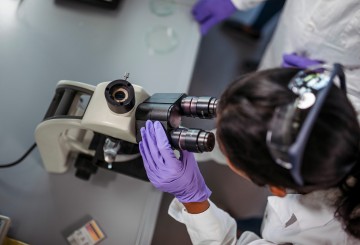The Pat & Shirley Ryan Family Research Acceleration Fund, a significant $35 million initiative from Northwestern University and the Ryan Family Foundation, is actively propelling life sciences research with profound societal impact. This groundbreaking fund strategically invests in high-impact projects, effectively bridging the critical “valley of death” between academic proof of concept and successful commercialization, ensuring promising discoveries transition into tangible real-world applications and medical innovation.
To date, this vital initiative has judiciously awarded over $6 million in philanthropic funding across 25 meticulously selected projects. These projects emerged from a highly competitive pool of 177 proposals submitted by dedicated Northwestern University researchers, underscoring the rigorous evaluation process. Expert panels comprising both faculty and external specialists meticulously assessed each proposal, with final recommendations reviewed by a University leadership committee, ensuring only the most impactful scientific discovery receives support.
In its most recent third round, the fund allocated more than $2 million to empower nine exceptional research projects. These endeavors are specifically designed to translate cutting-edge life science discoveries into transformative, practical solutions that address pressing global challenges. This substantial investment, made possible by the unwavering commitment of the Patrick G. and Shirley W. Ryan Family, plays a pivotal role in advancing Northwestern’s overarching research mission and its dedication to translational science.
Among the innovative projects, researchers are pioneering a first-in-class, non-hormonal therapy to combat uterine fibroids, a condition affecting millions. This novel approach precisely targets TDO2, a crucial enzyme for the survival of fibroid cells, aiming to shrink fibroids by directly disrupting disease biology rather than merely managing symptoms. Simultaneously, another team is developing a rapid at-home diagnostic test for acute Lyme disease, leveraging a unique early-stage biomarker to deliver significantly faster and more accurate results than existing methods, offering a profound impact on infectious disease detection and patient outcomes through biotech solutions.
Furthering the frontier of medical innovation, one project focuses on a next-generation implantable sensor for continuous monitoring of protein biomarkers related to diabetes. This device offers a transformative alternative to current glucose monitors by providing a comprehensive metabolic picture through real-time, continuous tracking of key disease markers. Another critical initiative involves an AI-powered tool to enhance the assessment of swallowing disorders, automating the identification of anatomical points and assigning clinically validated scores, thereby improving consistency and reducing diagnostic time in patient care.
In the realm of neurodegenerative diseases, a novel class of modular antibodies, termed “MegaMolecules,” is being developed to target toxic amyloid beta oligomers implicated in Alzheimer’s disease. These next-generation antibodies boast enhanced binding capabilities and improved ability to cross the blood-brain barrier, promising a more effective therapeutic option for a condition impacting millions globally. Concurrently, the innovative MASS-CAR system represents a modular approach to cancer therapy, employing a universal CAR-T cell with interchangeable, chemically tagged antibodies to flexibly target various cancers, including hard-to-treat forms like ovarian cancer.
The fund also supports the evolution of the National Institutes of Health Baby Toolbox® into the Remote Baby Toolbox (RBT), enabling remote assessment of infant cognitive, motor, and social development via smartphones. Patrick G. Ryan articulated the family’s vision, stating, “Our family established the Ryan Acceleration Fund to strengthen Northwestern University’s capacity to turn groundbreaking research into transformative results. By investing early in outstanding ideas, we’re helping to overcome one of the biggest hurdles in innovation – getting critical discoveries out of the lab and into the world.”
University leadership echoes this sentiment, with Eric J. Perreault, Vice President for Research, highlighting the fund’s role as a catalyst for innovation, especially vital amidst uncertainties in federal funding. Jian Cao, Associate Vice President for Research, commended the recipients for their bold research, emphasizing that these projects vividly reflect Northwestern’s collaborative culture and leadership in translating scientific discovery into tangible impact, serving as a crucial spark in its intentionally built innovation ecosystem.
The Ryan Family Research Acceleration Fund unequivocally plays a pivotal role in advancing Northwestern’s research mission, fostering crucial cross-disciplinary collaborations, and diligently working to deliver real-world healthcare solutions. Its strategic philanthropic funding continues to empower faculty to push boundaries, translating breakthrough discoveries into applications that not only improve lives but also significantly fuel the economy and solidify Northwestern’s position at the forefront of global scientific leadership and biotech solutions.






Leave a Reply